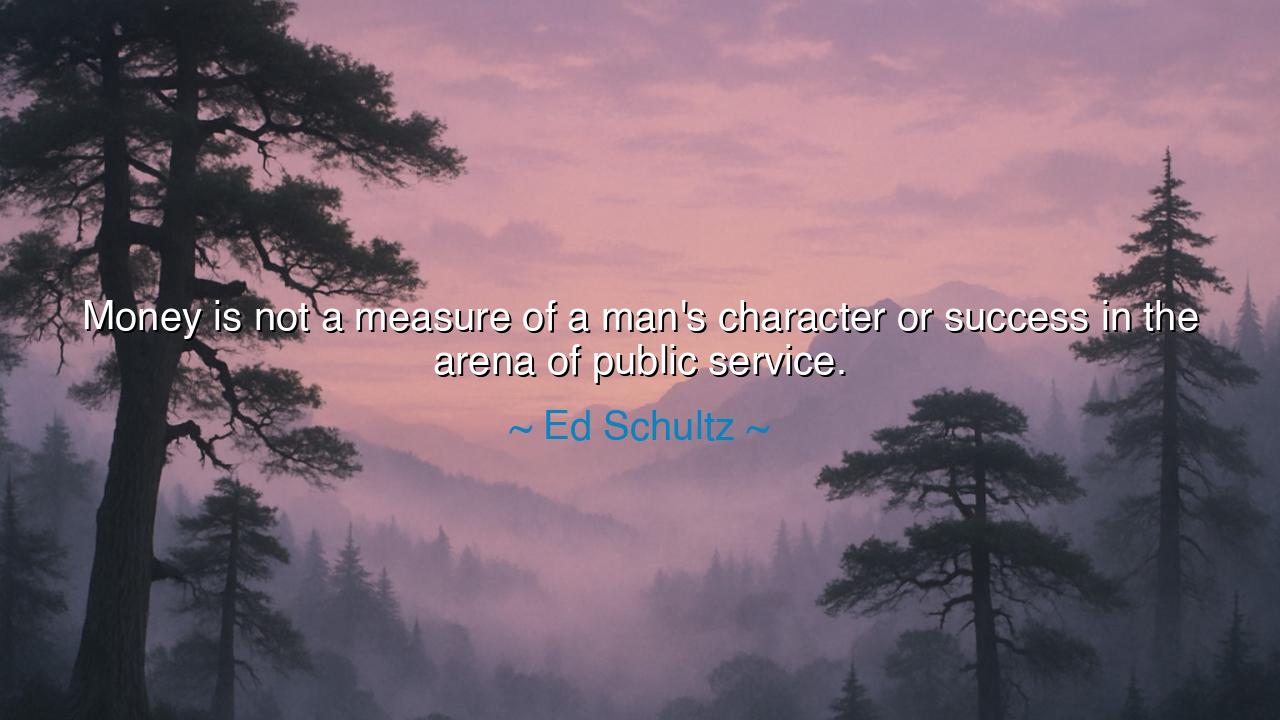
Money is not a measure of a man's character or success in the






The voice of the common people, Ed Schultz, once declared: “Money is not a measure of a man's character or success in the arena of public service.” In this truth, he calls forth a wisdom that the ancients themselves would have recognized—that wealth may gild the hands, but it cannot purify the heart. In the arena of public service, where men and women claim to stand for the people, the true measure is not the gold they hoard but the integrity, sacrifice, and courage they bring forth. To confuse money with character is to mistake the shadow for the flame.
The ancients warned against this very folly. In Rome, the Republic decayed when senators sought riches above duty, when public office was purchased with coin rather than earned through service. Cicero himself thundered against such corruption, declaring that the republic lives only when virtue outweighs wealth. Schultz’s words stand in that same tradition: reminding us that the guardians of the people must be judged not by their treasuries, but by their deeds.
Consider the life of Mahatma Gandhi, who wore the simplest clothes, ate the simplest food, and lived in near poverty. By the measure of money, he was no success at all. Yet by the measure of public service, he shook an empire and became a symbol of dignity and nonviolent power for all humanity. His wealth was not in coin, but in character, and through that character, his success resounded far greater than any merchant prince of his time.
In contrast, history offers us countless examples of rulers and officials who were rich in treasure but bankrupt in soul. They built palaces but left their people in ruins. They amassed fortunes but left behind only the stench of corruption. Their names do not endure in honor, for money cannot buy legacy. What remains in the memory of future generations is the weight of their actions, whether noble or vile, not the size of their accounts.
Schultz’s words also serve as a warning to the people themselves. Too often, society is dazzled by wealth, mistaking it for wisdom. We are tempted to believe that the man who has mastered coin has also mastered truth. Yet the two are not the same. Wealth may build roads and armies, but only character can bind communities and inspire hope. Public service demands humility, sacrifice, and a willingness to place the needs of others above self. These cannot be purchased; they must be lived.
The lesson for us is clear: do not measure leaders, or even yourself, by the standard of wealth. Measure instead by the standard of service—by the courage to speak truth, by the humility to listen, by the labor to uplift others. Remember that the world is not saved by rich men, but by good men, and that the wealth of character outshines the wealth of gold.
Practically, this means seeking opportunities to serve without expectation of reward. It means valuing honesty above gain, and using whatever resources you possess—great or small—for the betterment of others. It means demanding of those in leadership not the glitter of riches, but the weight of integrity. And in your own life, it means living so that your worth is measured by the lives you touch, not the coins you gather.
Thus, let Ed Schultz’s words be remembered as a shield against corruption and a call to nobility: money is not the measure of character, nor the true sign of success in public service. The true wealth of a leader is found in the service they render, the justice they uphold, and the honor they leave behind. To live by this is to live as the ancients counseled—with a heart richer than any treasury, and a legacy more enduring than gold.






AAdministratorAdministrator
Welcome, honored guests. Please leave a comment, we will respond soon